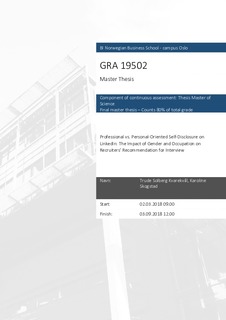Professional vs. Personal-Oriented Self-Disclosure on LinkedIn: The Impact of Gender and Occupation on Recruiters’ Recommendation for Interview
Master thesis
Permanent lenke
http://hdl.handle.net/11250/2580281Utgivelsesdato
2018Metadata
Vis full innførselSamlinger
- Master of Science [1621]
Sammendrag
Social networking sites (SNSs) have become established arenas for many forms of
social interaction. Recruitment and selection of job candidates using SNSs is a
current trend that we are yet to understand the potential consequences of. The
purpose of this study was to examine whether there is a difference between
professional-oriented and personal-oriented self-disclosure on LinkedIn profiles in
predicting recruiter’s recommendation for interview, with the impact of
occupation and gender. We created LinkedIn profiles that varied in regards to 1)
type of self-disclosure (personal-, professional-oriented), 2) occupation
(accountant, marketing coordinator), and 3) gender (male, female). The study was
conducted as an online survey where respondents with recruitment experience or
education related to recruitment participated by making their candidate
evaluations based on general job descriptions for both occupations. We found that
it is more beneficial for accountants to have a professional-oriented type of selfdisclosure
on LinkedIn than for marketing coordinators, and that recruiters’
recommendation for interview is higher for female accountants with professionaloriented
self-disclosure than for female accountants with personal-oriented selfdisclosure.
The same difference does not apply for male accountants. The results
indicate that norms and biases related to gender and occupation, and how
LinkedIn users disclose their profile information can lead to biased recruiter
decisions when LinkedIn is the platform for candidate assessment. This
knowledge could imply the need for implicit bias training and generally higher
awareness around such unconscious mental processes when using SNSs in
recruitment processes.
Beskrivelse
Masteroppgave(MSc) in Master of Science in Leadership and Organizational Psychology - Handelshøyskolen BI, 2018
